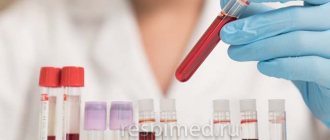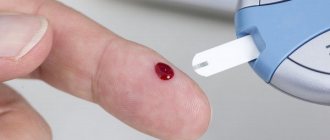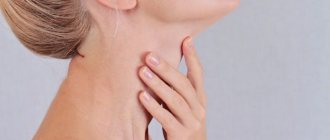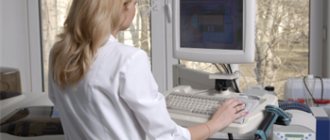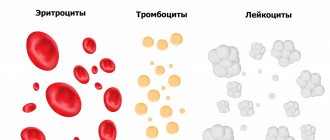A sugar test is indicated for suspected diabetes, as well as in the case of a diagnosed disease to monitor the patient’s condition. The test can be done in a laboratory or using a glucometer. To obtain the most accurate result, preliminary self-preparation is necessary. Is it possible to drink water before taking a blood sugar test?
Types of blood tests
Three main types of blood tests are common: general, biochemical, and sugar testing.
- General analysis allows you to obtain information on several parameters at once - it can include from 5 to 24 studied indicators. These include hemoglobin, red blood cells, platelets and leukocytes.
- Biochemical analysis allows you to assess the functioning of internal organs and the state of the metabolic process.
- Using a sugar test, the level of glucose in the blood is established, which is considered a key indicator in the diagnosis and subsequent treatment of diabetes.
Blood tests for hormones, AIDS or HIV infection are also common.
What you need to know to successfully donate blood for sugar
In order to take a blood sugar test, no special preliminary preparation is needed. It is necessary to lead your usual lifestyle, eat normally, consume enough carbohydrates, i.e. do not starve. During fasting, the body begins to release glucose from its stores in the liver, and this can lead to a false increase in glucose levels in the test.
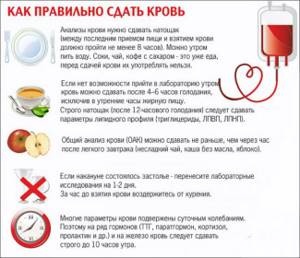
It is advisable to take a blood sugar test, like all other tests, early in the morning on an empty stomach.
It is in the early morning hours (before 8 am) that the human body has not yet begun to work at full strength; organs and systems peacefully “sleep” without increasing their activity. Later, mechanisms are launched aimed at their activation and awakening. One of them is increased production of hormones that increase blood sugar levels.
Many people are interested in why a blood sugar test needs to be taken on an empty stomach. The fact is that even small amounts of water activate our digestion, the stomach, pancreas, and liver begin to work, and all this is reflected in the level of sugar in the blood.
- Interpretation of blood biochemistry results for glucose
By the way, we recommend reading the article Diagnosis of insulin resistance, HOMA and caro indices
Not all adults know what fasting is. Fasting means not consuming food or water 8-14 hours before the test. As you can see, this does not mean at all that you need to fast from 6 pm, or even worse, all day if you are going to take the test at 8 am.
Basic rules of preparation
- do not fast beforehand, lead a normal lifestyle;
- before taking the test, do not eat or drink anything for 8–14 hours;
- do not drink alcoholic beverages for three days before the test;
- It is advisable to come for analysis in the early morning hours (before 8 am);
- A few days before the test, it is advisable to stop taking medications that increase blood sugar levels. This only applies to medications taken temporarily; there is no need to stop those you take on an ongoing basis.
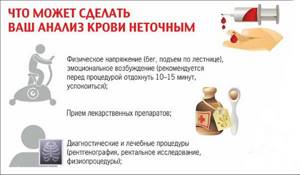
Before taking a blood sugar test, you should not:
- Smoking. During smoking, the body produces hormones and biologically active substances that increase blood sugar levels. In addition, nicotine constricts blood vessels, which complicates blood sampling.
- Brush your teeth. Most toothpastes contain sugars, alcohols, or herbal extracts that increase blood glucose levels.
- Do intense physical activity, go to the gym. The same applies to the road to the laboratory itself - there is no need to rush and rush, forcing the muscles to actively work, this will distort the result of the analysis.
- Carry out diagnostic interventions (FGDS, colonoscopy, radiography with contrast, and even more so complex ones, such as angiography).
- Perform medical procedures (massage, acupuncture, physiotherapy), they significantly increase blood sugar levels.
- Visit the bathhouse, sauna, solarium. It is better to postpone these activities until after the analysis.
- Be nervous. Stress triggers the release of adrenaline and cortisol, which raise blood sugar levels.
Rules for preparing for testing
In the vast majority of cases, the blood test is performed in the morning on an empty stomach - it is prohibited to eat any food 8-12 hours before the start of the test. This is the time necessary for its absorption, after which the main processes in the body are normalized. The ban implies a refusal to eat food the day before, which will prevent a chemical metabolic reaction. Violation of the requirement affects the chemical composition of the blood, in particular causing false positive results.
Taking into account the fact that tests are taken mostly at the beginning of the day, fulfilling the basic requirements most often does not cause difficulties. But there are a number of conventions. For example, fried and fatty foods should be eliminated from the diet 48 hours in advance. Also, at the request of the doctor, you can stop taking medications that affect blood clotting. The exception is when the analysis is carried out to control these indicators.
Tea, coffee and other hot and cold drinks are also prohibited. However, in the case of water, everything is far from so clear - it is necessary for the human body and, regardless of the type of analysis, will not affect the results. But this is only true if the amount of it consumed by a person does not exceed a few sips.
Can drinking water affect the accuracy of the results?
Is it possible to drink water before the morning blood test for sugar and cholesterol on an empty stomach? Many doctors believe that drinking various drinks can affect the results of laboratory tests. And indeed, this is so. If you decide to drink juice, coffee or tea with sugar, then in any case the results will no longer be reliable. These drinks contain carbohydrates, which means the product has nutritional value. They can rightfully be considered food. Therefore, it is important to follow a diet before various laboratory tests. In some cases, you can drink water before donating blood for testing. Although, there is a community of doctors who believe that you shouldn’t even drink before tests. But these are radical measures.
If your doctor has prescribed laboratory tests and blood donation from a finger or vein, it is better to ask the doctor for his recommendations. If it is not possible to consult a doctor, then the main thing is not to eat 12 hours before the examination.
Can drinking water affect research results?
If a general blood test is performed, the amount of liquid taken, if it is clean drinking water without dyes and sweeteners, does not matter. In this regard, even a large amount of it will not affect the results. However, in a number of other cases the situation is different - for example, during a biochemical study, as well as tests to establish cholesterol and hormone levels, it is forbidden to drink more than a couple of sips. Otherwise, the blood may become more liquid, which in turn will affect the performance.
This is due to the fact that water consists of chemical elements, therefore, under certain conditions it creates an error, including when studying hormonal parameters. The doctor must decide to prohibit the intake of a certain amount of water, based on the type of examination being planned and its direction.
General recommendations
All biochemical analyzes are included in the group of diagnostic methods and are widely used in a wide variety of fields of medicine. Some factors can distort the results of laboratory tests. To obtain the most reliable data, you must strictly follow the recommendations of experts.
When can I get tested?
You must visit the medical center within the period specified by your attending physician. The concentration of formed elements changes throughout the day. For example, an iron test should be taken in the first half of the day, namely no later than ten o’clock.
Can I have breakfast on the day of donating blood?
Most tests should be performed on an empty stomach:
- Hormonal, biochemical (bilirubin, glucose), serological (syphilis, hepatitis B). After dinner you need to wait about eight hours. Juice drinks and strong coffee should be excluded, drink purified water;
- A lipidogram (triglycerides, cholesterol, HDL) is performed after a twelve-hour fast.
Taking blood for a general analysis does not require a fast or serious restrictions. In the morning you are allowed to have breakfast and drink unsweetened tea.
Physical activity
Before donating blood from a vein, you need to minimize:
- Physical overexertion. Negative factors include sudden movements, going up or down stairs.
- Inner experiences. The patient may experience severe anxiety and stress.
Immediately before the study, you should rest a little, restore your breathing and tune in.
Taking medications
Necessary medical procedures are carried out at the initial stage or after the full course of treatment has been completed. This rule especially applies to antibiotics. Exceptions may be cases when it is necessary to find out the presence and exact concentration of the drug in the blood. If you are regularly taking health-maintaining medications, vitamins or minerals, you should inform your doctor in advance.
Hormonal testing
During laboratory diagnostics in girls or women of reproductive age, the final result of the research is influenced by physiological factors associated with various phases of the menstrual cycle. To eliminate errors and get the correct final results, you must strictly adhere to the specialist’s recommendations and donate blood for sex hormones only in a certain phase of the cycle.
About the time frame
If we talk about the time frame, then when donating blood for glucose, you can drink water, literally a few sips, no later than one hour before the test. More serious preparation is required when conducting biochemical tests - in this case, it is recommended to refrain from drinking heavily 8-12 hours before the test. No more than one to three sips are allowed.
It should be remembered that quenching natural thirst with a small amount of water will not have a strong effect on the results. First of all, the consequences can manifest themselves if the body encounters stress during thirst. This may lead to distortions and negatively affect the results. To avoid such cases, a number of doctors even recommend taking a small amount of water with you to the laboratory - this is done in order to calm the patient’s condition and relieve him of the feeling of nervousness.
Is it possible to drink water when donating blood for sugar?
Since the patient is instructed to fast 14–15 hours before the test, the question arises whether it is possible to drink water before donating blood for sugar, and also whether it is allowed to drink something other than water. Of course, it is not only possible to drink water, but also necessary in order to prevent dehydration of the body and changes in the biochemical properties of the blood, but it is fundamentally important that it is simple water without gases - boiled, mineral or simply purified. Consequently, you will have to give up sparkling mineral water, sweet drinks or even tea, not to mention juices and alcohol. In the morning before going to the clinic, it is enough to drink one glass of water to quench your thirst and not violate medical instructions.
Unlike drinks containing glucose or fructose, pure water will not affect blood sugar levels, allowing the laboratory to objectively assess the patient's condition.
Laboratory blood test for infections
When testing blood for infections, it is necessary to take into account that at the initial stage of infection the patient may have a negative result. However, this does not always mean the absence of the disease. In some cases, it is recommended to conduct a repeat study.
Modern medical centers have great capabilities and use a wide range of equipment and reagents for testing. Different clinical diagnostic laboratories use individual diagnostic methods, so the results obtained may differ.
In order for the assessment of the results to be as truthful as possible, it is necessary to conduct all diagnostic tests in one laboratory. In this case, the comparison of initial and final testing will be more correct.


